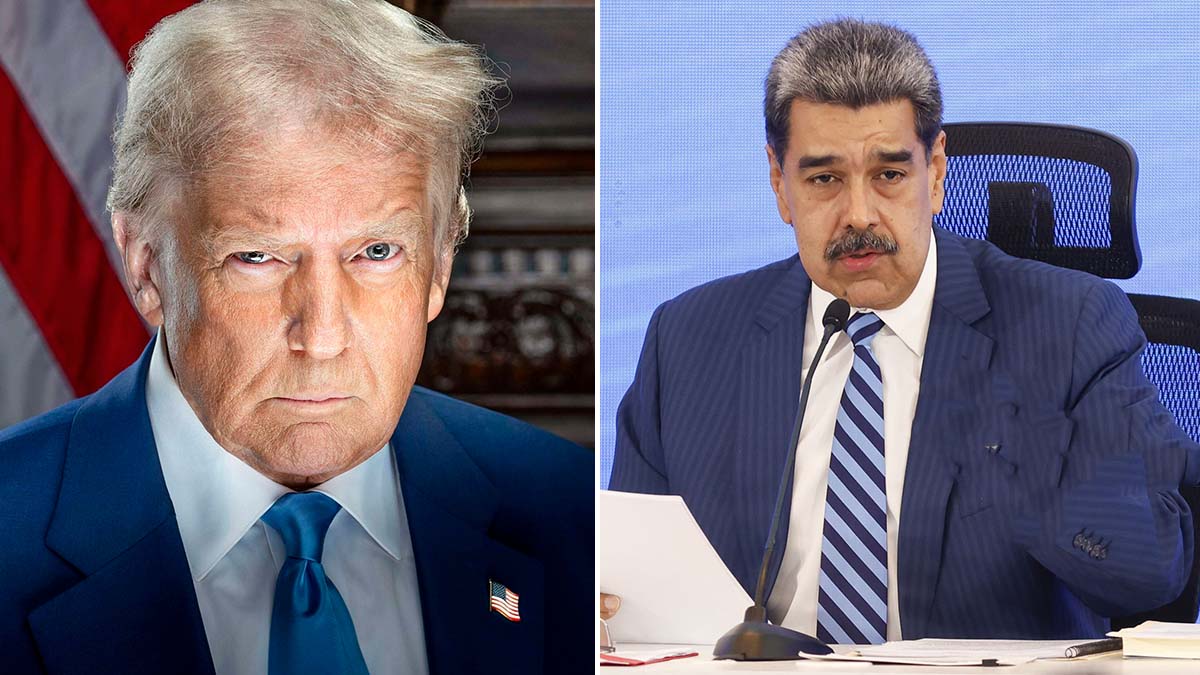President Donald Trump dropped a bombshell Sunday evening, revealing that Venezuelan strongman Nicolás Maduro has reached out and “would like to talk,” marking the first public acknowledgment from the White House that direct negotiations with the socialist regime could be on the horizon.
Speaking to reporters outside Mar-a-Lago after a round of golf, Trump said: “Venezuela would like to talk. Maduro wants to talk. We may be having some discussions with Maduro. I’ll talk to anybody. We’ll see what happens.”
The surprise statement comes just 48 hours after the Pentagon confirmed the largest U.S. naval deployment in the Caribbean in decades, including the nuclear-powered supercarrier USS Gerald R. Ford Carrier Strike Group – carrying more than 5,000 sailors and Marines, 90 aircraft including F-35C stealth fighters, and escorted by two guided-missile cruisers and four destroyers. A Virginia-class attack submarine armed with Tomahawk missiles has also been operating in the region, according to defense officials.
Trump refused to disclose details of any potential talks or intermediaries but hinted that Maduro’s outreach followed weeks of intense U.S. pressure. “They’re feeling it,” the president said. “Their economy is gone. Their military is tired. They know we have all the cards.”
Sources inside the administration told ABC News that National Security Advisor Michael Waltz and Secretary of State Marco Rubio have been presented with multiple military options for Venezuela, ranging from expanded maritime interdiction to limited airstrikes on regime targets. One senior defense official confirmed that “all options remain on the table, including boots on the ground if necessary.”
The dramatic escalation began after U.S. intelligence intercepted evidence that Maduro’s regime was allowing Iranian Revolutionary Guard Corps operatives to establish a permanent presence in Venezuela and was preparing to transfer advanced ballistic missile components through Venezuelan ports – a red line repeatedly cited by Trump.
Over the past ten days, the U.S. has conducted more than 25 high-profile seizures of vessels linked to Venezuela’s state oil company PDVSA, claiming they were carrying sanctioned crude and narcotics. U.S. Southern Command says cocaine shipments worth an estimated $2.8 billion have been intercepted since November 1.
Inside Venezuela, the situation remains dire. Hyperinflation has returned with a vengeance – prices are doubling every 18 days according to independent economists – while blackouts lasting up to 20 hours plague Caracas and other major cities. Defections from the Venezuelan military have spiked, with at least 42 mid- and high-ranking officers fleeing to Colombia or Brazil in the past week alone.
Opposition leader Edmundo González, recognized by the United States and more than 60 countries as Venezuela’s legitimate president-in-exile, welcomed the possibility of talks but insisted any negotiation must lead to Maduro’s immediate departure and free elections. “The Venezuelan people will not accept a deal that keeps the dictator in power,” González said in a statement from Madrid.
Regional leaders reacted with caution. Colombian President Gustavo Petro warned against “any unilateral military adventure,” while Brazilian officials confirmed they are in “constant contact” with the Pentagon to avoid miscalculations near their borders.
As of Sunday night, the White House has not confirmed a date or location for any potential Trump-Maduro meeting. When pressed on whether he would demand Maduro step down in exchange for lifting sanctions, Trump smiled and replied: “He knows what he has to do. Everybody knows what he has to do.”
The Ford Carrier Strike Group is currently conducting what the Navy describes as “presence operations” 180 miles north of Venezuela’s coast, well within striking distance of Caracas. F-35 pilots have been running round-the-clock combat air patrols, and satellite imagery shows B-2 Spirit stealth bombers have forward-deployed to Roosevelt Roads, Puerto Rico.
For now, the world waits to see whether Trump’s revelation signals the beginning of the end for the Maduro regime – or simply another chapter in the long standoff between Washington and Caracas.
